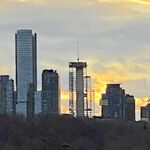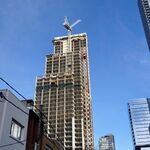Transportfan
Senior Member
Uh, did you consider that maybe people (at least the road travelling/map using sort) viewed them in conjunction? Sure, for primary purposes such as addressing, etc. Yonge is, was, and always shall be Yonge--no argument about that. Only a true idiot or absolute out-of-town motorist would have viewed it primarily as "Hwy 11", a la Hwy 27 in Etobicoke, Hwy 7 in York County/Region, etc. However, as long as common maps, highway maps and street maps, depicted Yonge as the central vertical red line with the "11" shield, it served a duel identity. Yonge Street it was, but it was a Yonge Street that also served as Hwy 11...and, of course, that "also-servedness" wound up being curdled into the cloying Queen's-Quay-to-Rainy-River longest-street-in-the-world mythos in the 70s. Yet however contrived that "mythos" was, there was an inherent grandeur to it, that of Yonge/11 as a gateway to the Great Beyond much as Michigan Ave/Route 66 was in Chicago (and re some of the "specially marked heritage highway" discussion in this thread, it's something that could even have been threaded on a la Historic Route 66, making lemonade out of that wretched "Longest Street In The World" lemon). It may have been subtle, but the "dual identity" of Yonge was strong...even if it's lost to younger generations who never really knew anything but the 400 as a primary corridor up north, and for whom Yonge/11 would have been a sprawly hellhole that no "sane" parent would have opted for en route to Muskoka and beyond.
I don't think you really now what I'm talking about.





